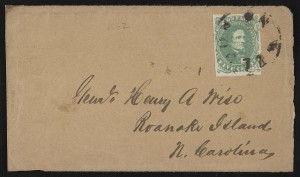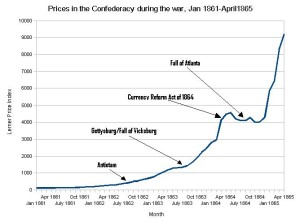From the Richmond Daily Dispatch August 21, 1863:
Postal communication Stopped.
–Resignation of the Clerks in the City Post-Office. –Yesterday evening the clerks in the City Post-Office resigned in a body, and the business of that office has come to a dead lock. This is a serious affair, both to the citizens and Government, and we have taken the trouble to inquire into the facts of the case. There are employed in the City Post Office an assistant postmaster at $1,500 per annum, a chief clerk at $1,400, two box clerks at $1,000, two distributing clerks at $900, and twenty-three clerks at $400 M — or, in other words, twenty-three men who are to pay their coating, clothing, lodging, and washing bills out of a sum which is not equal to seventy dollars before the war. Of course these employees could not live — could not even get food for such a sum — and they applied to the Post-master General for an increase. This increase that official said he could not give unless Congress voted it, and the clerks, therefore, resigned last night, and were paid off. These clerks who ask this increase are men who work hard, day and night, seven days in the week, and are as much entitled to $1,500 per annum, we should think, as the clerks in the other departments, who work, on an average, from two to seven hours a day six days in the week. Of the justice of this demand, however, we need not speak, as we believe it is not disputed.
We don’t suppose any reasonable man has a doubt that this general abandonment of the post- office can be prevented, and all the confusion consequent upon it averted, if the Government (of which Mr. Reagun [Postmaster General John Henninger Reagan] is not the head) will allow the clerks the increase asked, and which is positively necessary to their support, and no one doubts that Congress would appropriate the amount it brought [ in in ] the deficiency bill, and legalize the rise in their salaries. Extraordinary expenses are no new occurrences in Governments generally, nor in this one, and a little common sense can very easily adjust, this difficulty in the Post-Office Department.
Earlier in the week it had been reported that the postal clerks had not had any wage increase since the start of the war. From the Richmond Daily Dispatch August 17, 1863:
Ferment in the city Post-Office.
–We understand the clerks employed in the city Post-Office have held a meeting to set forth their grievances in a series of resolutions, passed nem con, expressive of their indignation in regard to the course the Postmaster-General has pursued towards them, individually and collectively, in his passive indifference to their frequent appeals for an increase of salary. Since the commencement of the war their salaries have not been advanced one cent, while everything else has gone up to enormous rates. Their present salaries, excepting that of the chief clerk, range from fifty to seventy-five dollars a month, while their board bills amount to ninety and one hundred dollars per month! And then their labor is of the most onerous kind, working twelve hours per diem, Sundays and week days.
There seems to be a discrepancy in the reported clerk wages between the two articles. Ex-governor and Confederate General Henry A. Wise commanded the Confederate troops during the 1862 Battle of Roanoke Island. It is written that “nem con” is a contraction of a New Latin meaning “no one contradicting”.
According to the October 1863 Stranger’s Guide the Richmond General Post Office was located on the corner of Bank and 11th Street. You can view that intersection after the 1865 devastation at Richmond Then and Now.
The inflation graph is published at Wikipedia.


